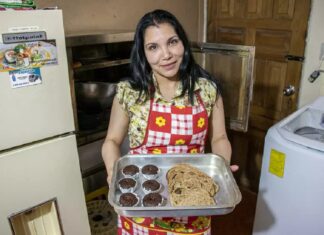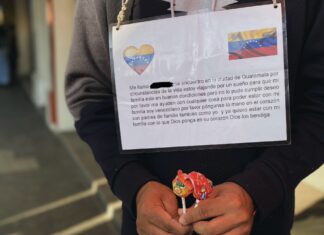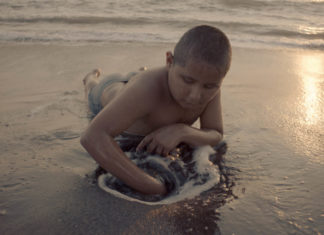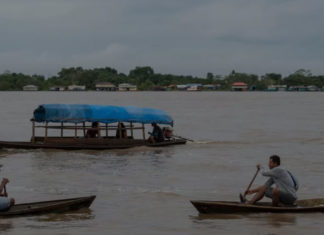Moving Forward: Health, care, and violence seen through the eyes of displaced Venezuelan women in Brazil
Moving Forward / Salir Adelante is a bilingual photobook by Pía Riggirozzi, Bruna Curcio, Tallulah Lines, and Natalia Cintra and dedicated to all migrant women and girls. The book is available Open Access online or in your hands in hardback in two bilingual editions: one in English/Spanish and another in Portuguese/Spanish.
Compiling photographs and testimonies from Indigenous Warao and non-Indigenous Venezuelan women displaced in Brazil, ‘Moving Forward’ offers a candid and often shocking insight into migrant women’s experiences. It specifically looks at the challenges these women face, their vulnerabilities, and their unwavering dedication to their families and communities in the face of adversity. The English/Spanish photobook addresses three main themes: caregiving and self-care; gender-based violence; and barriers to sexual and reproductive healthcare. It calls to attention the failures of programmes designed to protect migrant women and girls, and the need for responsive, gendered, and culturally-sensitive policy to support them.
Some photographs are artistic. Others are shocking. All, although full of love, paint a picture of the extreme and specific issues migrant women and girls face today, which impede them from enjoying the rights, dignity, and respect they are entitled to. ‘Moving Forward’ is an accessible book for the general public as well as students and policymakers committed to women’s rights, sexual and reproductive health, and the gendered experience in South-South corridors of migration.
Praise for ' Moving Forward'
‘This is a beautiful piece of work, highlighting not only the vulnerability of women, but also their resilience against the odds and their fierce protection of their children and families. This book should serve as a powerful reminder to all involved in migration policymaking of the importance of taking account of women’s experiences, in all their complexity.’
– Professor Heaven Crawley. Head, Equitable Development and Migration, United Nations University. Director, UKRI GCRF South- South Migration, Inequality and Development Hub (MIDEQ)
‘The photographs and testimonies in this book are moving and profound. Moving Forward is an invitation to see forced displacement and the struggle for equal rights through the eyes of displaced women and is also a call to make their journeys and their lives more visible.’
– Leiza Brumat, Eurac Research
About the authors
Pía Riggirozzi is Professor of Global Politics at the University of Southampton, UK. Her research focuses on the political economy of development, human rights, and regional governance in Latin America. She is currently working on research projects regarding gendered health inequalities, poverty, and the challenges of inclusive development in Latin America, funded by the Economic and Social Research Council and the Medical Research Council in the UK. Pía is Principal Investigator in the project ‘Redressing Gendered Health Inequalities of Displaced Women and Girls in Contexts of Protracted Crisis in Central and South America, (ReGHID). She has published on these topics in New Political Economy, Development and Change, Review of International Studies, and Economy and Society, amongst others.
Bruna Curcio is a communicologist and independent photographer and filmmaker. She graduated in Social Communication with a specialization in Cinema from Santa Fe University of Arts and Design, USA. Currently based in Amazonas, Brazil, she was the local coordinator for photovoice methodology on the ReGHID project and also directed the book’s documentary ‘Moving Forward’. Bruna designs, produces and manages audiovisual projects. Her work promotes the audiovisual as a tool for sharing culture and knowledge, disseminating information, promoting social inclusion, and protecting the environment.
Tallulah Lines is a Research Associate for the ReGHID project. She is based in the Department of Politics at the University of York where she is also a PhD candidate. Her PhD deals with art created as part of women’s collective action against gender- based violence in Mexico. Prior to starting her PhD, Tallulah completed her Master’s by Research in Women’s Studies and a Master’s in Social Research at the University of York. Tallulah’s research interests include feminism and gender in Latin America, critical art, social movements, and human rights. She is particularly interested in using creative and participatory methodologies in her research. Tallulah has lived and worked between the UK and Latin America since 2015, participating in activist and art projects and co-founding the feminist art collective Las Iluministas.
Natalia Cintra is a Research Fellow on the ReGHID project in the School of Economics, Social and Political Science of the University of Southampton. PhD in Law from PUC-Rio, her research focuses on migration, asylum, race, gender, human rights, and citizenship and belonging with respect to refugee and migrant communities in Latin America. She adopts Critical Race, Antiblackness, Feminist, Postcolonial, and Decolonial approaches and has expertise in qualitative methodologies. Prior to starting her role at the University of Southampton, Dr Natalia held legal roles in non-profit organizations in the UK and Brazil regarding the rights of refugees and migrants in these countries. She also held academic positions in research and teaching in several institutions and projects in Latin America and is a member of different research and professional networks for the rights of refugees and migrants.
Documentary film
‘Moving Forward’ is also a documentary film, directed and produced by Bruna Curcio in collaboration with the University of Southampton ReGHID project. Find out more here.






